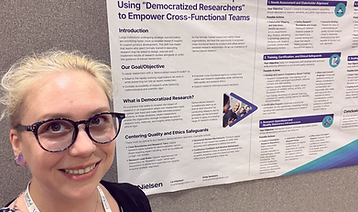
Portfolio
To respect confidentiality agreements and protect proprietary information, some portfolio examples have been password protected and anonymized or modified. Included artifacts may be re-worked, redacted, or generalized where appropriate, while still reflecting the processes, challenges, and outcomes of the original work.
Please email me for the password.
Democratized Research: A Model to Empower Cross-Functional Teams
I developed a framework for responsibly expanding research capabilities across an organization during periods of strategic transformation. It focuses on equipping non-researchers with foundational skills, tools, and ethical guardrails to conduct lightweight, tactical research while ensuring that expert researchers lead complex, strategic, or high-risk initiatives. The model emphasizes training, governance, and clear role delineation, creating a scalable system that maintains research quality and user-centered decision-making even as research responsibilities become more distributed.
Presented at AAPOR 2025 Conference
[public link coming soon]

Ethical Data Governance and AI Use in UX Research
I created a data governance framework for integrating AI responsibly into UX research, focusing on trust, transparency, and traceability. It proposes clear guidelines for how AI-generated insights and user data should be collected, stored, annotated, and applied, ensuring ethical use and alignment with research integrity. The framework emphasizes the importance of human oversight, consent management, bias mitigation, and auditability, positioning data governance as a foundational layer for both scalable AI-driven insights and trustworthy user experiences.
Created for this portfolio Summer 2025
[public link coming soon]

App User Perception Survey
I designed and fielded a web survey targeting former users of a mobile app to understand their reasons for disengagement and uncover opportunities for re-engagement. I used a mix of scaled questions and open-ended feedback to explore usability, trust, feature satisfaction, and motivational barriers. Insights from the study guided product and service design changes aimed at improving retention and rebuilding trust with key user segments.
Fielded using Qualtrics Spring 2023
[password protected link coming soon]

Chatbot & Live Chat Service Design
I led the end-to-end service design of a chatbot and live chat feature to improve mobile support accessibility and reduce user friction. I identified key pain points and designed conversation flows that balanced automation with human support through facilitating collaborative workshops, user journey mapping, and iterative testing. I partnered closely with Engineering, Operations, and Customer Support to ensure a seamless integration into existing workflows, resulting in faster resolution times (from days to minutes) and improved user satisfaction.
In production Summer 2025
[password protected link coming soon]

Long-term Research & Innovation Strategy for a Mobile App
I developed and executed a long-term UX research and innovation strategy to align product development with evolving user needs, business goals, and service delivery constraints. The strategy combined foundational, generative, and evaluative research methods across time, ensuring continuous learning and iteration. It prioritized inclusive design, access equity, and cross-functional alignment, and directly informed 0>1 product development, feature roadmapping, and process innovation across multiple touchpoints in the user journey.
Completed with the production rollout of 3 new app features Summer 2025
[password protected link coming soon]

Improving Information Access by Discontinuing Overdue Fees in a Library
I conducted a comprehensive research initiative to evaluate the impact of overdue library fines on patron behavior and access. This included a cohort survey of peer libraries, a budget analysis showing fines made up a minimal portion of overall revenue, and UX research on facility use and patron retention in relation to fine assessment. I also incorporated broader findings showing that fines disproportionately affect those who rely most on library services. Based on your research and recommendations, the library eliminated overdue fines to improve equitable access and long-term engagement.
Policy change implemented Fall 2018
[password protected link coming soon]
.png)